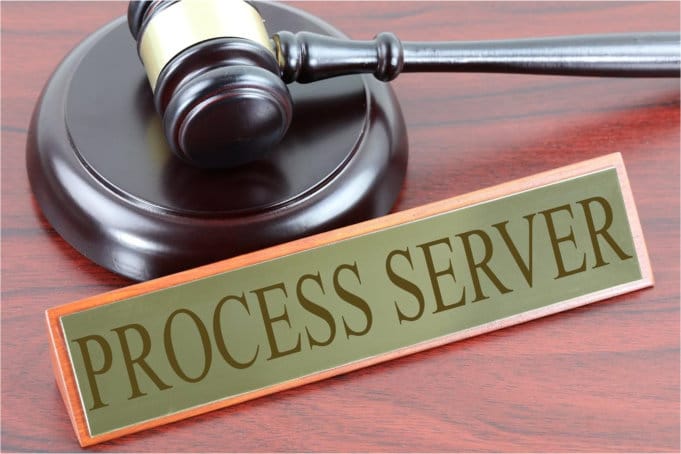Process Serving: Trick Tips to Make Certain Lawful Notifications Are Provided Appropriately
Process Serving: Trick Tips to Make Certain Lawful Notifications Are Provided Appropriately
Blog Article
Comprehending the Value of Refine Serving in Lawful Procedures
Process serving is an essential facet of lawful procedures that makes sure all celebrations are notified of their responsibilities and civil liberties. The subtleties of effective procedure offering expand past plain distribution; they include legal needs and prospective effects of improper solution.
Interpretation of Process Serving
Process serving is an important element of the lawful system, specified as the official shipment of lawful files to individuals associated with a court situation. This process makes sure that all events are adequately informed of legal activities being taken against them or to which they are a party. Typically, these records include summons, issues, subpoenas, and other court-related documents that require the recipient's focus and response.
The significance of procedure serving depend on its duty in supporting the principles of due process. It guarantees that individuals have notice of lawful process, thereby providing them an opportunity to react or protect themselves. Proper solution of process is not just a procedural formality; it is a basic element of ensuring fairness and openness in the judicial system.
Process offering can be carried out by different people, including professional process servers, legislation enforcement officers, or even lawyers, depending upon administrative policies. Each method of service has its very own standards and practices, which are critical to preventing hold-ups or terminations within the legal framework. As a result, recognizing the interpretation and function of procedure offering is necessary for all stakeholders involved in lawful proceedings.

Legal Demands for Process Offering
Legal needs for procedure serving are important to make sure that the delivery of legal papers abides by established methods and is identified by the court. Each jurisdiction has specific regulations controling how and when documents must be served, which might consist of subpoenas, summonses, and issues.
Commonly, process-server have to be unbiased third parties that are not involved in the instance. They must additionally adhere to state laws pertaining to service methods, which can include individual service, alternative service, or service by mail. Personal solution involves providing papers directly to the recipient, while substitute service enables shipment to an additional responsible person at the recipient's home or area of service.
Additionally, process web servers are typically required to file an evidence of solution, a lawful paper that confirms the delivery of documents, with the court. This paper includes information such as the day, time, and method of solution, in addition to the name of the person offered.

Duty in the Justice System
A crucial element of the justice system, process serving makes certain that people associated with lawful process are effectively alerted of actions taken against them (Process Serving). This official alert is critical for supporting the principles of due process, which mandates that parties have the opportunity to react to cases made versus them. Without efficient process serving, the legal system would certainly be provided inadequate, as people might engage in actions without recognition of pending lawful issues
Process-server offer an essential duty in securing the stability of the legal process. They work as neutral events, providing lawful papers such as summons, grievances, and subpoenas, thus cultivating openness and responsibility within the judicial framework. By ensuring that all events are notified, process offering assists to avoid any possible unjust advantage, enabling fair participation in lawful procedures.
Moreover, the professionalism and reliability of process-server adds to the general public's count on in the justice system. Their adherence to ethical practices and lawful requirements enhances the authenticity of the judicial procedure. Eventually, effective procedure serving is essential in advertising the guideline of regulation and making sure that justice is available to all people associated with lawful disputes.
Repercussions of Improper Solution
The repercussions of inappropriate service can substantially undermine the stability of lawful proceedings. When a celebration is not offered correctly, it can cause a host of complications, including hold-ups in the event timeline and enhanced lawful expenses. Improper service can lead to the offender not being aware of the lawsuit versus them, which might prevent them from responding properly or offering their protection. This lack of notice can eventually bring about default judgments, where the court guidelines in favor of the complainant without hearing the accused's side.
Furthermore, incorrect service can make court orders and judgments invalid, forcing the plaintiff to reboot the process, which can be both lengthy and economically difficult. It can likewise unlock to charms and difficulties, as the defendant might say that they were not effectively alerted of the procedures, complicating the legal landscape further.
Ideal Practices for Effective Solution

Second, timing plays a vital role. Serving files quickly can protect against delays in lawful process and ensure that all parties are alerted in a timely manner. In addition, working with a professional process server can boost efficiency, as they are trained to browse potential difficulties and make certain compliance with regional legislations.
Third, keeping accurate records of the solution procedure is critical. Documenting the visit our website date, time, and way of solution can give vital proof if disagreements emerge concerning whether service was click this link appropriately implemented.
Verdict
Finally, procedure offering is a crucial part of lawful treatments, making certain that all events are properly alerted and managed the possibility to react. Sticking to lawful demands and best methods not just promotes the principles of due process yet also enhances the stability of the justice system. The effects of incorrect solution can lead to significant hold-ups and difficulties, highlighting the need for efficient process serving in advertising justness and availability in legal disputes.
The subtleties of efficient process offering expand beyond mere distribution; they include legal needs and prospective consequences of inappropriate service.Process offering is a vital element of the legal system, specified as the formal distribution of lawful documents to people included in a court case. Without reliable process offering, the legal system would be provided ineffective, as people could involve in actions without recognition of pending legal issues.
Process web servers serve an essential function in protecting the integrity of the legal procedure - Process Serving. The effects of improper solution useful source can lead to significant hold-ups and issues, highlighting the necessity for efficient procedure offering in promoting justness and ease of access in legal conflicts
Report this page